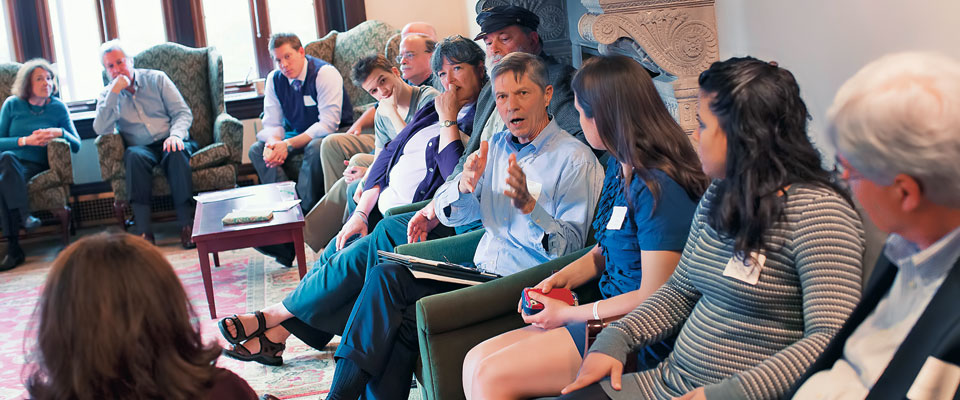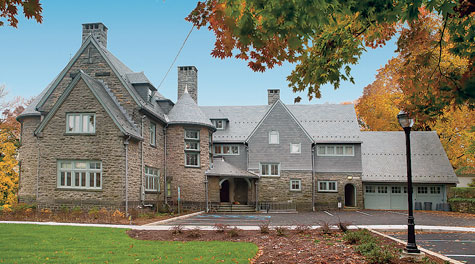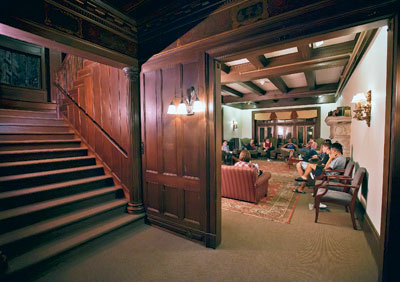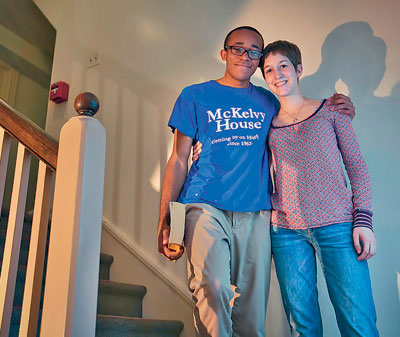Chautauqua of High Street

Robert Fisher ’68 makes key point during group discussion about connections between classical and contemporary civilization held during the McKelvy Scholar 50th anniversary reunion in October.
by Geoff Gehman ’80 | photography by Chuck Zovko
To spur an unwilling group to embrace his desire to lead a debate about the constitutional right to bear arms without infringement, Ben Wilmoth ’05 organized a field trip to a shooting club, a natural act for a gun-owning founder of Lafayette’s Fed Challenge Team. He wanted to discuss constructive uses of guns—like bonding with his father while shooting skeet. His housemates did not want to discuss destructive uses of guns—like killing deer and murdering high schoolers.
All but one of the 17 members of the group accepted his invitation, an extraordinary response from weapon skeptics, most of whom had never fired a weapon.
That Sunday afternoon students shot at clay discs from stations that simulated hunting scenarios, sharing the course with a father teaching his young daughter. That night they held a lively discussion about the many uses of guns: recreational, familial, lethal, legal, extra-legal. For more than two-odd hours they turned dueling monologues into dialogue.

This Second Amendment summit took place in 2005 inside and outside McKelvy House, a turreted shingle-and- stone mansion where ivory towers routinely fall. For nearly 50 years, resident scholars have held weekly dinners followed by banquets of topics, everything from genetic engineering to the science of children’s sarcasm to “Why Do We Care for One Another?” Joined by non-McKelvy students, professors, and visiting celebrities (novelist Ralph Ellison, activist Ralph Nader), they’ve created a role model for Lafayette’s living-learning communities, including the new Grossman House for Global Perspectives. Long before the College mandated cross-curricular scholarship and global citizenship, these strategies were practiced at the Chautauqua of High Street.
Architect of the McKelvy Scholars Program, Charles Chester Cole Jr. could have run his own chautauqua. A history professor and humanities scholar, he was also a World War II fighter pilot who fought for civil rights. Shortly after becoming dean of students in 1958, he envisioned a residence where diverse students could discover the discipline of discussing disciplines outside their disciplines. To him, high grades weren’t as important as high potential.
OPPOSITION AND SUCCESS
Cole received his building in 1960 when Lafayette acquired a 19th-century mansion designed by fabled architects McKim, Mead & White with a garden by fabled landscape architect Marian Coffin. The next year 16 students moved into the newly renamed McKelvy House, under a roof knifed, creased, and pinned like butterfly wings. They were supervised by resident faculty adviser John Losee, now Hogg Professor Emeritus of Philosophy.
According to Losee, Cole’s experiment had many opponents. Fraternity leaders worried their brothers would spend too much time at McKelvy. Science teachers worried their students would spend too little time in the lab. Administrators worried an off-campus scholars program would be elitist. Indeed, a story in the 1962 Lafayette-Lehigh football game program nicknamed McKelvy “the brain barn,” a classic case of damning with faint praise.
McKelvy succeeded because it quickly became a brain bank. The first three years featured a powerhouse of topics: labor management and the Vietnam “conflict,” Communist China and kibbutzim, evolution and miracles. An impressive list of guest speakers was topped by B.F. Skinner, the influential behavioral psychologist. A key endorsement came from Lafayette President K. Roald Bergethon, who came to College Hill with Cole in 1958.
McKelvy was an intellectual lab for Richard Alkire ’63, an Easton native who had walked past the mansion on his way to kindergarten. The chemical engineering major expanded his housemates’ horizons by discussing the intelligence of computers, gleaning knowledge from his summer internship with an oil-company computer. His own horizons were expanded by presentations on the fiction of Lawrence Durrell and James Joyce.
“I was in exposure and absorption mode most of the time,” says Alkire, emeritus professor of chemical engineering, University of Illinois at Urbana-Champaign, who was elected to the National Academy of Engineering in 1988 for imaginative research on engineering aspects of electrodeposition and corrosion and for leadership in electrochemical engineering. “A lot of things were wondrous to me, opening a bandwidth of awareness. It was terrific, like when a lake turns over and all the nutrients become available for everybody.”

Residents and guests gather on Sunday nights for dialogues in the spirit of deep inquiry and vigorous debate. This fall’s theme—the road less traveled—was chosen to honor the 50th anniversary
Actually, McKelvy’s topics have been as tidal as the ocean. Jessica Merkel-Keller ’04led a discussion on runway shows as performance art and fashion as a cloak of character. She listened to a discussion about men who seek to become HIV positive. Learning about “bug chasers” was part of her program of self-actualization, which continues as a resident in psychiatry at Johns Hopkins Hospital.
For Darlyne Bailey ’74, McKelvy was a forum for analyzing –isms, and a refuge from the worst ones. Here she felt comfortable discussing the sexism she experienced as one of Lafayette’s first female students. “It was a safe environment to swap ideas,” says Bailey. “I learned to stop and learn where the other person was coming from, to look for common ground.” Consensus building was a cornerstone skill for the future dean of Bryn Mawr College’s graduate school of social work and social research.
THEATRICAL ACTS
Bailey never lived in McKelvy; as head resident adviser she was required to live on campus. She missed the chance to be inspired by the house’s many charismatic places. Zachary Romano ’10, now an assistant literary agent, turned his suite, a former movie theater, into a recruiting center for registering voters for the 2008 elections. Paul Levy ’68, president/CEO of Philadelphia’s Center City District, played tackle football in the snow in the backyard, scrambling to prevent balls from disappearing off the bluff.
A music professor and composer, David Meckler ’82 loved the paneled circular library, where he wrote an honors thesis and played in a woodwind quintet. Stephen Parahus ’84 loved the round room under the library in the cavernous basement. Here he read Shakespeare in a stage whisper in the light of a goose-necked lamp in an area so distant, “it had its own zip code.”
Shakespeare stars in Parahus’ favorite McKelvy episode. In 1983 he helped host a reception for five English actors who staged radically stripped versions of Shakespeare plays. He and his housemates supplied food and “zillions” of black Russian cigarettes, says Parahus, a senior consulting actuary for Towers Watson, a risk-management/human-resources consulting fi rm. The party broke up at sunrise with everyone “feeling very festive, very high, very ‘Brideshead Revisited.’”
Understanding human nature has been one of the many duties of McKelvy’s resident faculty advisers. They have served as therapists and counselors, moderators and referees, supervisors and shepherds. Some have significantly shaped the program. Ellis Finger (1974-76) led trips to experimental plays in Manhattan and an American Indian powwow before he became founding director of the Williams Center for the Arts. Helena Silverstein (1996-2000), professor and head of government and law, hosted a discussion about greed for a CBS News Sunday Morning segment on Americans facing the new millennium.

McKelvy Scholars Kyle Tucker ’14 (left), president, and Hannah Weaver ’14
Several changes have been shepherded by the current faculty adviser, Caroline Lee, who grew up in an 18th-century house. The assistant professor of sociology initiated the practice of inviting non-residents to lead events, which has led to making ratatouille with French Club members and borscht with Russian Clubbers. She takes students to a farmers’ market to encourage them to eat healthier.
“I want students to be passionate about their topics, to understand why others are passionate, to have articulate disagreements, to take ideas in new directions,” says Lee. “I want them to get them used to awkward silences, to realize it’s okay if they fail sometimes. There’s so little time in college for them to have this free space to try dialogue with people who aren’t their friends. For two hours each week they’re not all texting; they’re not all emailing. They’re all present.”
LEGACY THAT LINGERS
McKelvy prepares students to be present in all tenses. Megan Feeney ’11 discovered the advantages of disadvantages. “It was a little nerve-wracking to realize how much I didn’t know, that I had to learn something each week, and not for school,” says the doctoral student in philosophy at Rutgers University-New Brunswick, who led a discussion about animal welfare. “It didn’t make me necessarily question my opinions, but it made me realize I needed to learn more in order to have informed opinions.”
Saying he is a better communicator and leader due to McKelvy, Kyle Tucker ’14 adds, “I’m more passionate about philosophy, about causing critical thinking.” A biology major, he has argued that malaria deserves more support than breast cancer because it kills more people. “I was a normally quiet person before I joined the program; now, I talk even when I don’t feel like talking.” Tucker plans to talk more and take more action, as McKelvy’s new president.
Alkire credits minor debates at McKelvy with helping him understand major debates over atomic weapons, which he experienced as a graduate student working in the lab where plutonium was discovered. Wilmoth credits minor decisions at McKelvy with helping him understand major decisions at the White House, where he was an aide to the chief of staff for former President George W. Bush, an avid supporter of the constitutional right to own guns.
Seven years have passed since Wilmoth led the Second Amendment summit, and he still marvels at his peers’ freedom of mind. “I give them a lot of credit for trying on other people’s shoes, for stepping out of their comfort zone into more of a danger zone,” says the recent MBA recipient. “But that’s McKelvy to me: a diverse, decent family who can agree to disagree.”